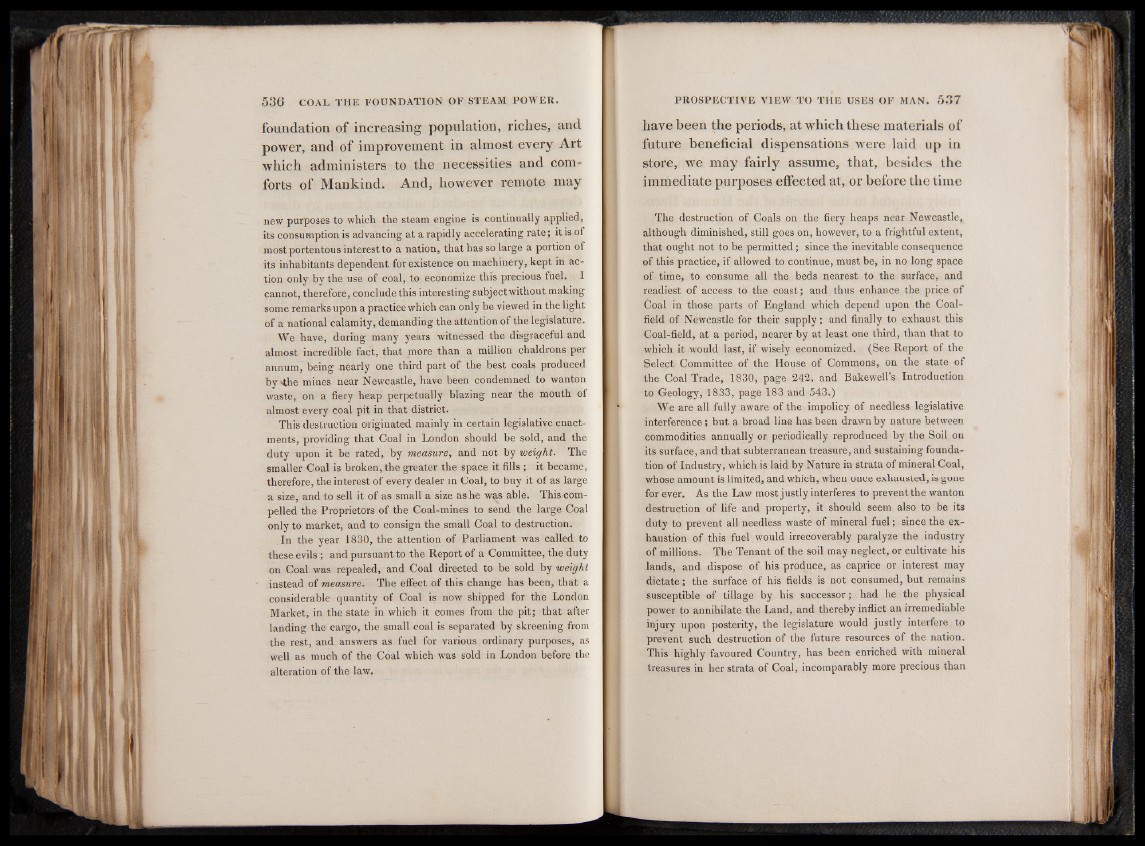
foundation of increasing population, riches, and
power, and of improvement in almost every Art
which administers to the necessities and comforts
of Mankind. And, however remote may
new purposes to which the steam engine is continually applied,
its consumption is advancing at a rapidly accelerating rate; it is of
most portentous interest to a nation, that has so large a portion of
its inhabitants dependent for existence on machinery, kept in action
only by the use of coal, to economize this precious fuel. I
cannot, therefore, conclude this interesting subjectwithout making
some remarks upon a practice which can only be viewed in the light
of a national calamity, demanding the attention of the legislature.
We have, during many years witnessed the disgraceful and
almost incredible fact, that more than a million chaldrons per
annum, being nearly one third part of the best coals produced
by -the mines near Newcastle, have been condemned to wanton
waste, on a fiery heap perpetually blazing near the mouth of
almost every coal pit in that district.
This destruction originated mainly in certain legislative enactments,
providing that Coal in London should be sold, and the
duty upon it be rated, by measure, and not by weight. The
smaller Coal is broken, the greater the space it fills ; it became,
therefore, the interest of every dealer in Coal, to buy it of as large
a size, and to sell it of as small a size as he was able. This compelled
the Proprietors of the Coal-mines to send the large Coal
only to market, and to consign the small Coal to destruction.
In the year 1830, the attention of Parliament was called to
these evils ; and pursuant to the Report of a Committee, the duty
on Coal was repealed, and Coal directed to be sold by weight
instead of measure. The effect of this change has been, that a
considerable quantity of Coal is now shipped for the London
Market, in the state in which it comes from the pit; that after
landing the cargo, the small coal is separated by skreening from
the rest, and answers as fuel for various ordinary purposes, as
well as much of the Coal which was sold in London before the
alteration of the law.
have been the periods, at which these materials of
future beneficial dispensations were laid up in
store, we may fairly assume, that, besides the
immediate purposes effected at, or before the time
The destruction of Coals on the fiery heaps near Newcastle,
although diminished, still goes on, however, to a frightful extent,
that ought not to be permitted; since the inevitable consequence
of this practice, if allowed to continue, must be, in no long space
of time, to consume all the beds nearest to the surface, and
readiest of access to the coast; and thus enhance the price of
Coal in those parts of England which depend upon the Coalfield
of Newcastle for their supply; and finally to exhaust this
Coal-field, at a period, nearer by at least one third, than that to
which it would last, if wisely economized. (See Report of the
Select Committee of the House of Commons, on the state of
the Coal Trade, 1830, page 242. and Bakewell’s Introduction
to Geology, 1833, page 183 and 543.)
We are all fully aware of the impolicy of needless legislative
interference; but a broad line has been drawn by nature between
commodities annually or periodically reproduced by the Soil on
its surface, and that subterranean treasure, and sustaining foundation
of Industry, which is laid by Nature in strata of mineral Coal,
whose amount is limited, and which, when once exhausted, is gone
for ever. As the Law most justly interferes to prevent the wanton
destruction of life and property, it should seem also to be its
duty to prevent all needless waste of mineral fuel; since the exhaustion
of this fuel would irrecoverably paralyze the industry
of millions. The Tenant of the soil may neglect, or cultivate his
lands, and dispose of his produce, as caprice or interest may
dictate; the surface of his fields is not consumed, but remains
susceptible of tillage by his successor; had he the physical
power to annihilate the Land, and thereby inflict an irremediable
injury upon posterity, the legislature would justly interfere to
prevent such destruction of the future resources of the nation.
This highly favoured Country, has been enriched with mineral
treasures in her strata of Coal, incomparably more precious than